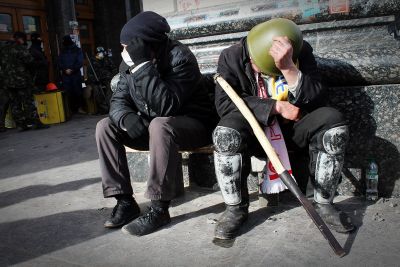A New Opening for the EU?
Edward Lucas of the Economist is right. When it comes to Ukraine, both the United States and the European Union acted too late.
February 20, 2014 -
Paweł Kowal
-
Articles and Commentary

Photo: Wojciech Koźmic
One should bear in mind that there was no EU reaction to Russia’s trade blockage of Ukraine introduced last year. Instead of opening up its markets to at least some of the goods blocked at the Russian-Ukrainian border, the EU remained passive. The Association Agreement with Ukraine could have been signed in the summer of 2013. Why did we have to wait until the Vilnius Summit in November? Why did we have to listen to the anti-Russian rhetoric vociferously uttered by some European politicians when we could have seen the EU member states offer their readiness to help Ukrainians come closer to our community? A crucial few months of delay gave the Kremlin an opportunity to strategically pressure the Ukrainian economy.
Already in December of last year just after the protests erupted in Kyiv the EU should have abolished visas for Ukrainians. The example of the Western Balkans shows that when there is a will, even EU red tape can be effectively torn down. And yet, make no mistake, visa abolishment does not equate to lax border controls or an opening up of labour markets to new immigrants, a great fear to many. It would simply mean abolishing a corrupt system which humiliates the Ukrainian people by forcing them to stand in long queues in order to pay a hefty amount for a permit to enter the EU.
In mid-November of last year, during a series of meetings in Minsk, Sochi and Novo-Ogaryovo, Vladimir Putin persuaded Viktor Yanukovych not to sign the EU Association Agreement. Reportedly, the atmosphere of these talks was not very friendly. This was a moment to initiate a different series of talks, such as Yanukovych-Merkel or Yanukovych-Barroso. Such meetings could have also been an opportunity to, once more, bring the EU offer to the table and complete it with some additional elements.
Subsequent visits to Kyiv made by US Assistant Secretary of State Victoria Nuland were also an opportunity for the EU and the US to combine their offers and take common action. But one thing was lacking: political imagination and a capacity to overcome EU-US animosities and ambitions. “F…the EU” has had an effect on the already cold friendship. Instead of the things that could have been done, the EU started believing in the idea of a political solution that would lead to a transitory government, basically freeing Brussels from its Ukraine problem. Instead of taking the riskier path of a new opening to Ukraine, an easier way was chosen. Stabilisation seemed like a better choice over long term economic aid. It was even just a few days ago that the EU was ready to accept a solution of moving Ukraine back to 2004 just to avoid signing the Association Agreement.
The Kyiv massacre has put an end to this plan and paradoxically created an opportunity for a new opening. A mission on behalf of Catherine Ashcroft to Kyiv of three foreign affairs ministers – Radosław Sikorski of Poland, Frank-Walter Steinmeier of Germany and Laurent Fabius of France – could bring results given that the ministers receive strong support from the EU (whose problem is not necessarily a bad treaty which does not allow it to work effectively). The problem is that until now, Brussels has had its own policy, Germany its own; even Poland and Lithuania did not cooperate the way they should have. Divisions also followed party lines. The European People’s Party supported its own Ukrainian partners and the socialists their own. The Polish Foreign Minister Radosław Sikorski now has a chance for success but only if he is given the opportunity to become, at least for some time, the main communication channel between Brussels and Kyiv.
The next thing to consider is our goals. Undoubtedly, the first aim should be the breaking of the spiral of silence. The second should be a guarantee from the Ukrainian government that it will restrain from the further use of force. Here in the background lurks the problem of sanctions. Limiting EU policy solely to sanctions is not enough. That is why the outcome of the Sikorski-Steinmeir-Fabius mission must be a high-level summit on Ukraine with the participation by the EU, the US, financial institutions and interested states. The best location for such a summit would be Warsaw.
Russia has made its offer to Ukraine without consulting anybody. Now it is time for the West to show the Ukrainians, on paper, its own offer. Bearing in mind, no aid plan should be started without elections in Ukraine. The stakes are the following: we aim towards the stabilisation of the situation in Ukraine, but then we are guaranteed another protest in a few years. Or our goal is the modernisation of the country. In the case of the latter, solely a new government in Kyiv, even if participated by the members of the opposition, is not enough.
Translated by Iwona Reichardt
Paweł Kowal is a Polish member of the European Parliament and Chairman of the EU-Ukraine Parliamentary Cooperation Committee in the European Parliament. He is also a member of the New Eastern Europe editorial board.

































